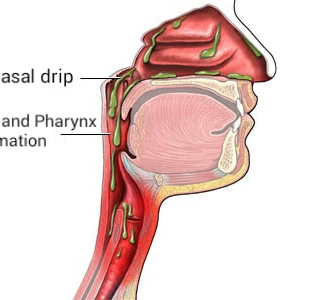Post nasal drip
- Jahanara Monaf

- Nov 2, 2022
- 3 min read
Postnasal drip is a common occurrence, affecting almost everyone at some point in their lives. The glands in your nose and throat continually produce mucous to fight infection, moisten nasal membranes, filter out foreign matter. You typically swallow the mucous without even realising it.
When your body starts producing extra mucus, you might feel it accumulate in the back of your throat. You may also feel it dripping down your throat from your nose. This is called postnasal drip.
Common symptoms of postnasal drip include:
Feeling that you need to constantly clear your throat or swallow.
A cough that’s worse at night.
Nausea from excess mucus moving into your stomach.
Sore, scratchy throat.
Bad breath.
Since post nasal drip is fairly common, there are many reasons you may be experiencing it. Allergies is usually the most common reason for it and a deviated septum can also be the culprit.
Some other reasons you may be experiencing post nasal drip are:
Cold temperatures.
Viral infections resulting in the cold or flu.
Sinus infections.
Pregnancy.
Changes in the weather.
Dry air.
Spicy foods.
Certain medications, including some blood pressure and birth control prescriptions.
If you’re suffering from post nasal drip (which is quite common), you’re probably looking for ways to clear things up, understandably. No one wants to be forever toting a box of tissues.
Drink more fluids: thick mucous is more likely to be uncomfortable and disrupt your breathing. Thinning it out can help to reduce blockages, reducing your risk of sinus or ear infections. An easy method to thin your mucous is to drink an adequate amount of fluids each day.
Ginger tea: although ginger has not been studied for its effects on post-nasal drip, the spicy root has been used to help relieve congestion. The warmth of the liquid can also soothe a sore or irritated throat.
Get a humidifier: using a humidifier can help to raise the moisture level in the air.
Gargle with saltwater: gargling with warm salt water may help to clear mucus from the back of the throat and soothe a sore throat. Try stirring one teaspoon of salt into 8fl oz of lukewarm water.
Avoid alcohol: avoid alcohol and caffeinated drinks, which may cause further dehydration and inflammation to add to your discomfort.
Vitamin C: Vitamin C, a powerful antioxidant, can boost up the immune system to help the body resist various types of infections." She suggests squeezing half a lemon in warm water and adding honey to taste, which is known for its anti-bacterial and anti-viral properties.
Use menthol: eucalyptus and peppermint oil are two common essential oils that are used to help clear the nasal passages and breathe easier. Karpuzoglu suggests adding a couple of drops of these oils in your humidifier’s fragrance diffuser to break up the congestion and soothe the nasal passages.
Lavender: add a few drops of lavender oil to any carrier oil and rub this on your chest, back, and throat.
Garlic: garlic contains a compound called allicin that exhibits antimicrobial properties. It is also widely used as a natural treatment for relieving symptoms of cough and cold, which are often the common reasons for an individual to develop post-nasal drip.
Tumeric: turmeric is considered to be a natural decongestant and is widely used for treating cough and cold due to its antibacterial and anti-inflammatory properties.
Oil pulling: oil pulling is a detoxifying treatment that can help in decongesting your throat. The antimicrobial and anti-inflammatory properties of the oil that you use for swishing will help treat your post-nasal drip naturally.
Pineapple juice: pineapple contains an enzyme called bromelain that exhibits anti-inflammatory and antibacterial properties. Hence, it is often used as a potent expectorant to decongest the phlegm and treat post-nasal drip.




Comments